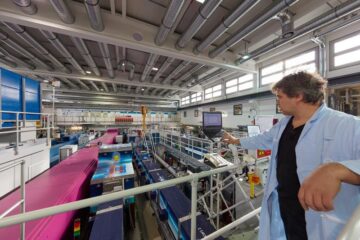Pellicious – Self-coating of lipid pellets by an extrusion/spheronisation process

The taste of a pharmaceutical product is a very important aspect in drug development as it possesses a major influence on the patient compliance, especially in the paediatric population. The present invention relates to a newly discovered method for preparing lipid pellets by solvent-free extrusion/spheronisation whereas the lipid coating on the entire pellet surface is formed during the spheronisation process. Said lipid coating is almost free of active ingredients and is responsible for a desirable delayed drug release depending on temperature. The
benefits of this new principle are taste-masking, stabilisation of active ingredients for a prolonged storage time and protection of the mucous membrane in the oral cavity against irritation. Commercial opportunities Different applications for this new method are possible. First of all, any pharmaceutical formulation with a pleasing taste would definitely be preferred over a competitor`s product and would translate into better compliance and therapeutic value for the patient. Second, stabilisation of active ingredients sensitive to moisture, oxygen or light is in the focus of drug development. Therefore, an ongoing need for coating of pellets exists. The aim of the present invention is to provide an economical process allowing the production of coated formulations while reducing costs and time of preparing the same. The invention comprises a simple process for generating solid pellets with an in-situ lipid coating, providing taste-masking or stabilising pharmaceutical formulations. With this self-coating procedure, a separate coating step of particulate formulations is thus no longer necessary.
Weitere Informationen: PDF
PROvendis GmbH
Tel.: +49 (0)208/94105 10
Ansprechpartner
Dipl.-Ing. Alfred Schillert
Media Contact
Alle Nachrichten aus der Kategorie: Technologieangebote
Neueste Beiträge

Bakterien für klimaneutrale Chemikalien der Zukunft
Forschende an der ETH Zürich haben Bakterien im Labor so herangezüchtet, dass sie Methanol effizient verwerten können. Jetzt lässt sich der Stoffwechsel dieser Bakterien anzapfen, um wertvolle Produkte herzustellen, die…

Batterien: Heute die Materialien von morgen modellieren
Welche Faktoren bestimmen, wie schnell sich eine Batterie laden lässt? Dieser und weiteren Fragen gehen Forschende am Karlsruher Institut für Technologie (KIT) mit computergestützten Simulationen nach. Mikrostrukturmodelle tragen dazu bei,…

Porosität von Sedimentgestein mit Neutronen untersucht
Forschung am FRM II zu geologischen Lagerstätten. Dauerhafte unterirdische Lagerung von CO2 Poren so klein wie Bakterien Porenmessung mit Neutronen auf den Nanometer genau Ob Sedimentgesteine fossile Kohlenwasserstoffe speichern können…

















